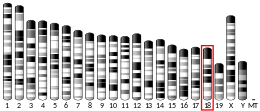The beta-2 adrenergic receptor (β2 adrenoreceptor), also known as ADRB2, is a cell membrane-spanning beta-adrenergic receptor that binds epinephrine (adrenaline), a hormone and neurotransmitter whose signaling, via adenylate cyclase stimulation through trimeric Gs proteins, increases cAMP, and, via downstream L-type calcium channel interaction, mediates physiologic responses such as smooth muscle relaxation and bronchodilation.[5]
Robert J. Lefkowitz[6] and Brian Kobilka[7] studied beta 2 adrenergic receptor as a model system which earned them the 2012 Nobel Prize in Chemistry[8] “for groundbreaking discoveries that reveal the inner workings of an important family of such receptors: G-protein-coupled-receptors”.
The official symbol for the human gene encoding the β2 adrenoreceptor is ADRB2.[9]
- ^ a b c GRCh38: Ensembl release 89: ENSG00000169252 – Ensembl, May 2017
- ^ a b c GRCm38: Ensembl release 89: ENSMUSG00000045730 – Ensembl, May 2017
- ^ "Human PubMed Reference:". National Center for Biotechnology Information, U.S. National Library of Medicine.
- ^ "Mouse PubMed Reference:". National Center for Biotechnology Information, U.S. National Library of Medicine.
- ^ Johnson M (January 2006). "Molecular mechanisms of beta(2)-adrenergic receptor function, response, and regulation". The Journal of Allergy and Clinical Immunology. 117 (1): 18–24, quiz 25. doi:10.1016/j.jaci.2005.11.012. PMID 16387578.
- ^ "The Nobel Prize in Chemistry 2012". NobelPrize.org. Retrieved 2021-07-04.
- ^ "The Nobel Prize in Chemistry 2012". NobelPrize.org. Retrieved 2021-07-04.
- ^ "The Nobel Prize in Chemistry 2012". NobelPrize.org. Retrieved 2021-07-04.
- ^ "Entrez Gene: ADRB2 adrenoceptor beta 2, surface". Retrieved 8 February 2015.





